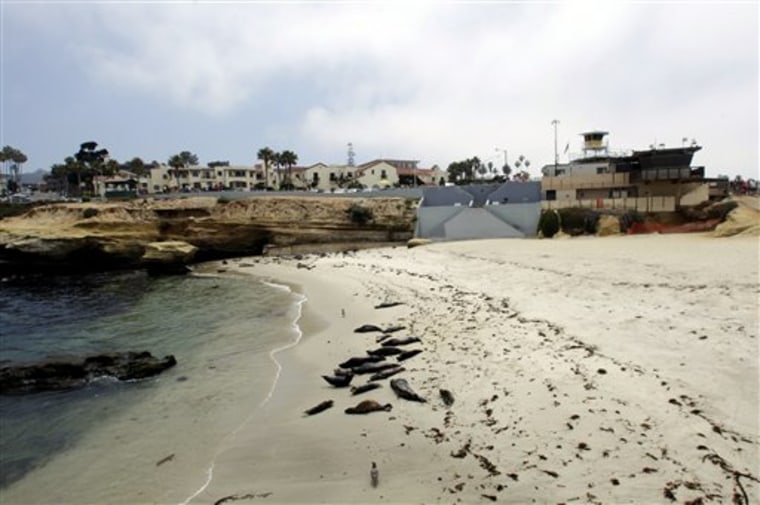Gov. Arnold Schwarzenegger has signed a bill that may allow federally protected harbor seals to stay on a beach cove in La Jolla, despite a judge's earlier order to begin chasing them away.
Lisa Page, a spokeswoman for the governor, says Schwarzenegger signed Senate Bill 428 shortly before 5 p.m. Monday.
Earlier Monday, a San Diego Superior Court judge ordered the city to begin removing the harbor seals from the sheltered cove by Thursday morning or face steep fines.
But the bill adds a marine mammal park to the list of acceptable uses for the sheltered beach, meaning the city can challenge the seal removal order.
As it stands, the city will spend nearly $700,000 to chase the animals away with recordings of loud, barking dogs.
San Diego County Superior Court Judge Yuri Hofmann had ordered the city to comply with a 2005 order by another judge to restore the Children's Pool cove to its original condition in response to a lawsuit filed by a disgruntled swimmer.
The city planned to hire someone to walk the beach with a public address system broadcasting the sound of barking dogs to scare off the seals, said Andrew Jones, the assistant city attorney for civil litigation.
The city cannot use force because the seals are a federally protected marine species.
"There's certainly a lot of emotions revolving around this issue. We expect that this person could be harassed, even physically attacked," he said.
The Children's Pool is one of only two beaches in Southern California where harbor seals give birth and nurse their young.
The plan, which was created with the help of the National Oceanic and Atmospheric Administration, would cost an estimated $688,000.
At the same time, attorneys for seal supporters filed an emergency motion with the 9th U.S. Circuit Court of Appeals late Monday hoping to prevent the animals' ouster. They also plan to file papers in state court and hold a rally later this week.
An appeals court decision could come by Wednesday, said Bryan Pease, an attorney for several pro-seal groups.
Pro-seal campaign
"The seals need rest each day. If they don't get their rest, their health will be jeopardized and the local community will also suffer a huge economic cost," said Dorota Valli, who coordinates a pro-seal campaign for the Animal Protection and Rescue League. "It's an enormous tourist draw."
At the pool Monday, about two dozen seals lounged on the sand as throngs of tourists watched them.
One wasn't impressed.
"I don't particularly like them. I think they smell, and I'm not interested in looking at them," said Kees Hendricks, 60, of Vancouver Island in Canada. "I don't think there should be a whole beach for the seals."
But others said they found local residents' complaints about foul odors from the seals to be exaggerated.
"Well, to me, it's the aroma of the sea," said resident Ken Walsh, 58, a nearby resident who swims in the ocean daily.
"There's a lot of places where the seals are not," Walsh said. "And I think we should feel privileged to be in a spot where people want to come just to see those little seals."
Children's Pool was created by a sea wall built in 1931 through a gift by La Jolla philanthropist Ellen Browning Scripps. It was donated to the city on condition that the beach become a public swimming area and park.
Bacteria doesn't stop everyone
Seals began showing up in increasing numbers during the 1990s. In 1997, the city posted a warning that the pool shouldn't be used because it was contaminated with high levels of bacteria from seal waste.
Still, some people continue to use it.
The judge's ruling Monday is the latest development in a lawsuit filed in state court in 2004 by a swimmer who grew disgusted with the seal waste and alleged a seal sanctuary did not meet the uses listed in the state trust.
Paul Kennerson, an attorney for the swimmer, did not return a message Monday.
Another federal case was recently dismissed on jurisdictional grounds, Pease said.
It's unclear what steps the city could take if the plan to scare away the seals fails.
"That's a good question," Jones said in a telephone interview. "Do you have any suggestions?"
